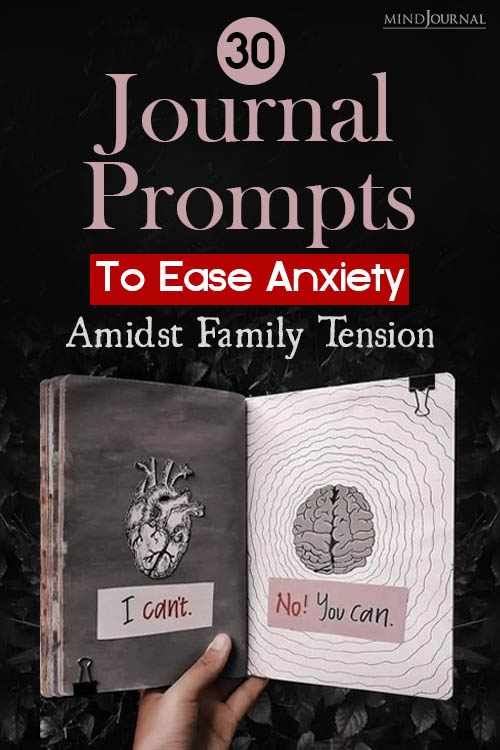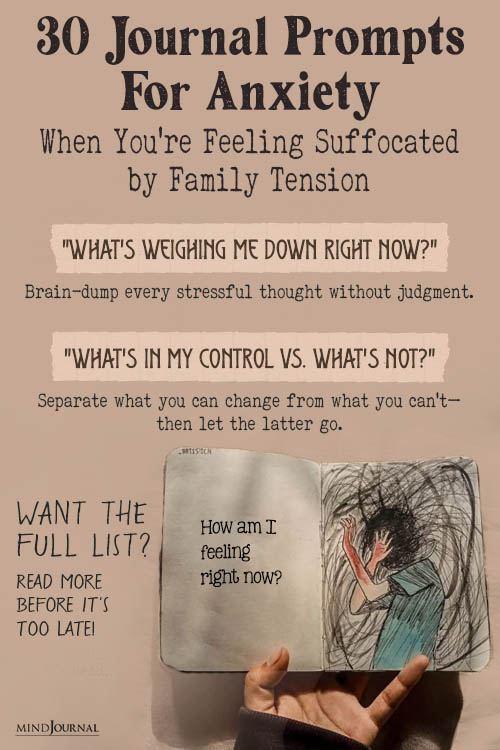When family tension feels overwhelming, turning to a few journal prompts for anxiety can be a comforting and grounding practice. These 30 prompts can help you navigate and soothe those anxious moments.
If you are reading this, you know EXACTLY what it feels like when family tension starts to weigh down on you. It’s like you are carrying a backpack filled with rocks, and every passive-aggressive comment or disagreement feels like you are adding another rock to the already heavy weight you are carrying.
The constant pressure of navigating these tense situations can leave you feeling anxious, on edge, and unsure of how to cope. Trust me, I have been there more times than I can count. But fear not, because there is a simple tool that can help lighten that load: Journaling.
Before I started journaling, I would feel like my anxiety always got the best of me, not knowing what to do to help myself. When I started journaling as a way to cope with my emotions, I was able to compartmentalize my thoughts much more effectively.
When you begin to put your thoughts onto paper, you start to acknowledge your feelings and give yourself space to explore your anxiety.
So, grab your notebook, get cozy, and let’s talk about how journal prompts for anxiety can be a game-changer in dealing with the challenges of family tension.
How do Journal Prompts Help with Family-Induced Anxiety?
Anxiety can feel like a constant companion when you are facing family tension. When you are constantly worrying (and hey, I have been there), your brain can feel MESSY.
And because people raised in an unhealthy family dynamic often learn to bury, brush aside, or ignore their own emotions to cope with their environment, if you don’t work through what is making you anxious, it can be overwhelming real quickly.
Not only that, now as an adult, when you have to feel your emotions and untangle the suppressed feelings, it can be confusing or overwhelming. Without understanding what you are feeling, you won’t be able to know what you need to help regulate yourself.
That’s where journaling can be a good start in helping you explore your emotions by writing them down on paper. It’s not just writing—it’s survival.
Think of journaling as a roadmap for your thoughts, guiding you to understand what is really bothering you, what sets you off, and why. The journal prompts for anxiety I have provided will help you pinpoint what is making you anxious and then help you deal with it better.
When family tension suffocates you, identifying specific triggers and emotions can be helpful in tackling them head-on.
For example, if you were caught in the middle of a family argument and feel overwhelmed because of it, journaling can help you reflect on how that made you feel and find ways to cope so you can take back control of your own emotions.
Personally, journaling has been a game-changer for me. When I am overwhelmed, I get flooded by emotions pretty quickly, and it’s important to take space so I can slow down enough to understand what I need.
Journaling helps me with exactly that. So, give these prompts a shot—they might just become your go-to tools for dealing with family stress, too.

How to Start a Journaling Practice?
If you are new to journaling, it can seem daunting, but trust me, it is easier than you think. All you need is a notebook, pen, and the willingness to give one of the journal prompts for anxiety a try.
Find a journaling spot where you wont be interrupted or distracted, whether it’s in a cozy corner of your home or outside in nature.
Here are simple 3 steps to help you get started with your journaling practice when you are dealing with family-induced anxiety:
1) Recognize the Need
Recognizing the need to journal begins with paying close attention to your emotions. For many people raised in a dysfunctional family, it can be hard to focus on yourself and your emotional well-being due to years of prioritizing other’s needs and suppressing your own emotions.
If you are new to recognizing your emotions, start by noticing physical sensations like muscle tension, racing thoughts, changes in your breath, or feeling like there is a pit in your stomach when you are around a specific family member.
These physical sensations are like clues that you can use to figure out the underlying emotion.
As you continue to pay attention to your physical sensations, you will start to identify patterns in your emotional responses to family tension. You can utilize this awareness as the foundation for using journaling as a tool for coping with your emotions.
The next time you need help with slowing down your thoughts, start by paying attention to how you feel.
2) Carve Out Time
If you are actively dealing with family stressors, it may be hard to find time to journal. The perfect time and space might not always be available, so it can be helpful to find pockets of peace in your day, whether it’s in the day when things are quiet or during the evening after things have settled down.
Remember, you can journal anywhere. I carry my journal everywhere with me. That way, I can express myself whenever and wherever I can. The goal is to seize any opportunity you get to help yourself navigate the complexities of family-induced anxiety.
All you need is your notebook and pen (or try an anxiety journal app). I have already provided the journal prompts for anxiety.
3) Start Writing
Now that your body has signaled you to start journaling and you carved out some time, it is time to start writing. Remember, there is really no wrong way of journaling. Just start by writing down whatever comes to mind.
Don’t stress about the grammar. No one is going to read this besides you, so just let the thoughts flow freely on paper. If you don’t know where to start, don’t worry.
The journal prompts for anxiety below will help you explore your emotions and reactions to the family tension. Choose a prompt and start writing
30 Journal Prompts for Anxiety When You’re Feeling Suffocated by Family Tension
Here are 30 writing prompts for anxiety to help you deal with family tension:
1) Reflect on a recent family gathering that left you feeling anxious. What specific moments or interactions triggered your anxiety?
2) Write about the dynamics between family members during moments of heightened stress. How did they react towards each other, and what role did they assume within the family?
3) Explore coping skills you are trying to use to manage your anxiety at the moment. Is it helpful? What other skills can you try using?
4) Reflect on the connection between your current anxiety symptoms and past family stressors. Have you felt this way before?
5) Write an affirmation you can repeat to yourself when your anxiety peaks during family interactions. How does it help you?
6) Explore a physical sensation you are experiencing when feeling suffocated by family tension. How would you describe it?
7) Consider how each family member reacted to the situation. How did their response contribute to your emotions?
8) Explore the thoughts racing through your mind. What recurring worries or fears surface?
9) Explore the impact of experiencing when your feelings are brushed aside or ignored by your family members. How does it affect your sense of self-worth?
10) Write about the emotions bubbling beneath the surface when you are experiencing family-induced anxiety. What specific feelings are you dealing with?
11) Think about a time you felt invalidated by your family member dismissing your anxiety. How did it intensify your feelings?
12) Describe how carrying the weight of family tension impacts your ability to function in daily life.
13) Write about the sense of powerlessness you experienced when family tension becomes overwhelming. How can you regain a sense of control in those moments?
14) Express your feelings about constantly having to suppress your emotions to avoid conflict within your family. How does that make you feel?
15) Think about the internal conflict between wanting to draw boundaries from family tension and feeling obligated to engage because they are your family.
16) Describe a coping mechanism you used as a child when facing family tension. Does it continue to help you as an adult, or does it make your anxiety worse?
17) Write a letter to a specific family member expressing how their actions contributed to your feelings of anxiety. (Don’t worry, you don’t have to give them the letter)
18) List one thing you wish your family understood about your anxiety.
19) Write about a boundary you need to set with your family member to protect your mental health.
21) Describe 1-2 healthy coping skills you have discovered for managing family-induced anxiety.
22) Choose an affirmation to write about that can remind you of your resilience in the face of family tension.
23) Reflect on a time when you felt criticized by a family member. How did that impact your sense of identity?
24) Think about different communication styles within your family during tense moments. How did each family member express themselves?
25) Reflect on the connection between your family’s communication style and your anxiety levels.
26) Write about a moment of self-care you practiced during stressful family situations.
27) Describe how you typically cope when your family does not meet your needs. Is there a similarity in your responses? If so, what’s something different you can try this time?
28) Write about a boundary you have set with yourself to prioritize self-care during times of family tension.
29) Write about a recurring pattern of behavior within your family that contributes to your anxiety.
30) Write about a family member who served as a source of support when you were struggling with anxiety.
5 Additional Journal Prompts for Overthinking
Here are 30 writing prompts for anxiety to help you deal with family tension:
1) What specific emotions are you experiencing right now because of the tension in your family? How do these emotions manifest in your thoughts and actions?
2) Write about an interaction or event within the family that triggered feelings of overthinking. Are there any patterns or recurring themes you notice?
3) Reflect on any boundaries you need to establish during family interactions? Continue to write about how you can communicate these boundaries effectively while respecting the needs of other family members.
4) Think about how you can reframe your thoughts about family tension to reduce overthinking? (Is there an alternative perspective you could adopt to foster a sense of understanding and empathy?)
5) Write about 1 self-care practice you can incorporate into your daily routine to manage your overthinking.
Tips for Journaling
1) Start with simple prompts
There are a few points to keep in mind when using the journal prompts for anxiety. If you are new to journaling, start with simpler prompts that are focused on exploring your emotions, physical sensations, and thoughts.
For example, “How am I feeling right now?” or “What thoughts are running through my mind?” can be an easier place to start and help you ease into the journaling process.
2) Prioritize Distress Tolerance
If your anxiety is overwhelming or particularly intense, you might benefit from prioritizing distress tolerance before diving into journaling.
Ask yourself, “On a scale of 1-10, how anxious am I feeling right now?” If your answer is 8, 9, or 10, engage in activities that help regulate your emotions and bring a sense of calmness.
This includes splashing some cold water on your face, breathing exercises, or engaging in some movement. Once you lower the intensity of your emotions, you will be able to approach journaling with greater emotional stability.
3) Avoid fueling your rumination
Remember, journaling is not about dwelling on your unhelpful thoughts. It is a powerful tool that can help you process your emotions and gain insight.
As you are journaling, if you find yourself fixating on the topic at hand or replaying stressful situations, gently redirect your focus toward constructive reflection and problem-solving.
You want to focus on specific triggers and patterns of behaviors that contribute to your anxiety, allowing you to gain insight into your experiences.
If you find it challenging to redirect your attention, step away from journaling and engage in some distraction techniques to help create some space between your thoughts.
I also find that having journal prompts for anxiety and stress can help maintain your focus on the topic at hand instead of open topics.
FAQ’s for Journaling
1. How can the journal prompts for anxiety help with family tension?
Journaling provides you with a safe space to express your thoughts and emotions without judgment. When you are dealing with family stressors, it is not uncommon to get flooded by emotions, making it difficult to articulate how you are feeling.
Some of you may be able to articulate how you are feeling but not be validated, leading to further frustration. When you write about your experiences and associated emotions, you get clarity and relief, allowing you to be intentional about your response.
2. What should I journal about for anxiety?
When journaling for anxiety, it can be helpful to focus on one situation but various aspects of that experience. The main idea with these journal prompts for anxiety is to explore your emotions and engage in self-reflection to allow for deeper introspection and discovery.
Here are some suggestions on what to journal about:
- Emotions
- Triggers
- Coping Strategies
- Gratitude
- Affirmation
- Progress or Self-Reflection
3. How often should I use the journal prompts for anxiety to see results?
I get this question frequently, and my answer is the same: it depends on individual preferences and needs. Some may find it beneficial to journal every day, while some might only pull out their journal when they feel triggered by something.
The goal is to find what works best for YOU. Remember, only some entries are a breakthrough, and journaling is not a destination. When you keep writing, your results will be evident in your thoughts, emotions, and behaviors.
So there you have it. 30+ mental health journal prompts for anxiety when you are faced with family tension. Journaling for stress relief is a great way to unload your thoughts and emotions onto paper allowing you to feel a sense of release.
I hope you find these journal prompts for anxiety as helpful as I do.
Written By Nisha Patel
Originally Appeared On Brown Girl Trauma











Leave a Reply